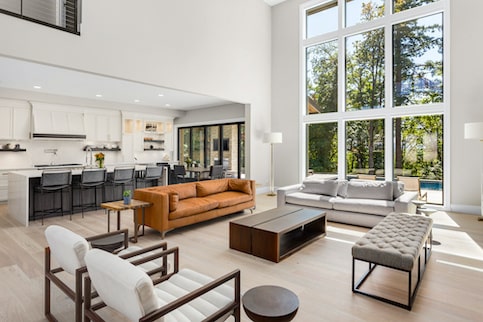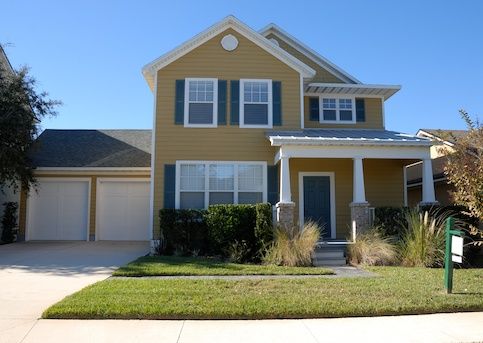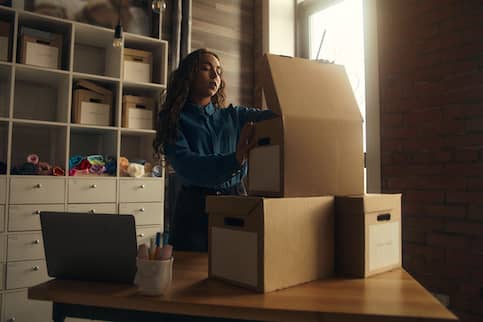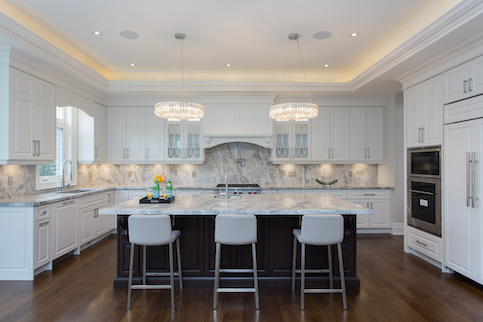Should I Sell My House And Rent When I Retire?

Do you feel like you should sell your house once you retire? It’s a common thought, especially when retirees still owe money on their mortgages. They worry that homeownership will be too much, but there’s more to consider.
If you’re wondering “Should I sell my house and rent when I retire?”, keep reading to learn what you should consider when deciding if you should sell your family home and become a renter.
See What You Qualify For
You can get a real, customizable mortgage solution based on your unique financial situation.
Should I Sell My House When I Retire?
Many people assume they should sell their house when they retire. After all, retirees don’t need as much space anymore. Having more money available for other expenses can provide peace of mind, too.
Before you assume downsizing is the right choice, ask yourself the following questions.
Am I Ready To Downsize?
Before downsizing, ask yourself if you’re ready. Selling your home and moving to a smaller home isn’t just a physical change, but an emotional one. You’ll give up your family home or the place you made memories. Is it something you’re comfortable with, or will you have regrets?
Do I Need More Money For Other Expenses?
As you determine if you’re ready to move to a new home and rent rather than own a home, decide if you’ll need more money free for other expenses.
You’ll likely have more money available for other expenses when you sell your current home. Since renting doesn’t require the exact costs, such as real estate taxes and homeowner’s insurance, you may have more money free to take care of other needs.
Many retirees use the money they save when they sell their current home to cover their increasing medical expenses, pay off other consumer debt, and put more money away for their retirement years.
Can I Afford A New Home?
It might seem strange to think about whether you can afford to sell your home and move into a new apartment, but retirees must consider many factors.
First, bear in mind the state of the real estate market. If it’s a buyer’s market, you might not make as much money selling the house as you thought. If you lose money on the deal or make less than you thought, it might be harder to afford to move.
Before you decide if you can afford a new home, talk with a real estate professional about your home’s market value to ensure it’s worth it.
Do I Want To Leave This Area?
Because selling your family home and moving to a new home is an emotional decision, ask yourself if you are ready to leave the area.
If there aren’t any rental properties or apartments in your area, are you willing and capable of leaving the community you’ve been a part of for many years? Ask yourself if you are comfortable moving to a new neighborhood and getting to know the community there.
Can I Continue My Daily Routine Somewhere Else?
If you’ve been retired for a while and already have a daily routine, can you see yourself following this routine in a new location? Think about what you do daily and how easy (or not) it would be to do this in a new area.
For example, if you go for daily walks, is the area you’re considering safe for walks alone? If you exercise, shop, or attend church regularly, will these amenities be available to you where you move?
If you haven’t created a daily routine yet or are ready for a change, selling your current home and starting somewhere fresh might be just what the doctor ordered.
Is My Home In Good Enough Condition To Sell?
If you want to sell house and rent in retirement, evaluate your home’s condition. You’ll likely get top dollar for your home if buyers think it’s in pristine condition.
If your home needs work, though, it could decrease its value and how much buyers are willing to pay for it. This could reduce your profits and leave you with less money to use for other expenses in retirement.
See What You Qualify For
Home Purchase
Home Refinance
Tap Into Equity
Should I Keep My House When I Retire?
There are many reasons you might want to keep your house when you retire. If any of these statements resonate with you, maintaining your home might be the best choice.
You Are Emotionally Attached To Your Forever Home
What if you’re not ready to sell your “forever home”? Your family home is where you likely raised your children and made many memories. If you aren’t ready to give that up and live elsewhere, you might consider keeping your house when you retire.
You Enjoy The Local Area
If you’re tight with the community and enjoy the places you go and the people you see, you might not be ready to leave the area. On the other hand, if there isn’t an available rental in the area you’re used to, you might want to keep your home and the community you’re most comfortable with in your daily life.
Your Home Is Perfect For What You Need
Just because you retired doesn’t mean you have to move. If your home provides you with what you need and doesn’t feel excessive or cause difficulties in getting around, you may want to keep it.
You Have A Future Plan For The Home
If you plan to pass the home down to your loved ones or sell the house to family members, you may want to keep the home and follow through on your goals. Even if you didn’t share the idea with your family members, but it’s something you’ve thought about for many years, keeping the home may be in your best interests.
You’re Financially Stable Enough To Stay In The House
If you’ve evaluated your budget and know you are financially stable enough to afford the house, you might not want the hassle of moving. Make sure you consider all the home expenses and other expenses you’ll incur, including medical expenses and any emergencies.
View Your Refinancing Options
See recommended refinance options and customize them to fit your budget.
Should I Rent When I Retire?
When you retire, you might decide that renting is a better option. Even after years of owning a home, renting has its benefits.
You’re Able To Downsize
It’s easy to downsize when you rent. You can find a smaller home or even an apartment that will give you the freedom to live clutter-free. If you’re ready to let go of the many things you’ve accumulated throughout your life and live stress-free, downsizing may be a good fit.
There’s Less Maintenance And Upkeep
You are no longer responsible for the home’s exterior repairs and maintenance when you rent. This means no more mowing the lawn, shoveling the snow, or dealing with the trash. This can free up even more of your time, giving you more freedom to do what you want during retirement. This is especially helpful as you age and can’t do as much.
You’ll Have More Freedom
As a renter, you’ll have more freedom to move about. Most leases are short-term (usually 1 year), so this gives you the option to move to different areas if you want. This also allows you to live with family, try new places, or even move farther away if that’s what you want during retirement.
You Can Enjoy The Amenities
Many rental properties offer incredible amenities that you may have more time to enjoy during retirement. Standard amenities include pools, gyms, tennis courts, walking trails and group classes.
During retirement, it’s nice to have a reason to get out of the house and a way to meet new people. Keeping yourself busy and finding new hobbies or passions can be crucial to your good health during retirement.
You Can Explore A New Community
If you’re looking for a new community during retirement, renting can be the perfect way to find one. Not only can you try different areas, but you can also meet new friends and find your new sense of community. In addition, most rental properties are within close proximity of one another, so it’s often easier to make new friends than when you own a larger property that isn’t as close to others.
The Pros And Cons Of Selling A House To Rent In Retirement
There are pros and cons of selling a house to rent in retirement. Knowing both sides can help you determine which option is best for you.
Pros Of Renting Vs. Owning
- It’s less of a commitment. You don’t have to feel trapped in a long-term purchase. Since most leases only last for a year, you may feel less pressure to stay in an area if it isn’t a good fit.
- You can find a better location for your current lifestyle. Because you can move around often, finding a location that suits your new lifestyle is easier. Even if it takes a while to figure out what that lifestyle is when you’re newly retired, you can explore without feeling committed.
- You are no longer responsible for maintenance and upkeep. Since you don’t have to worry about maintenance and upkeep, you will have more time to take care of yourself, explore the area, and spend time with friends and family, which is what retirement is all about.
- You no longer have to pay property taxes. As a renter, you aren’t responsible for the property taxes. Instead, the homeowner must pay them. This can free up your finances and give you more options as you decide where to live.
Cons To Renting Vs. Owning
- The cost of rent can fluctuate. Rent prices can change yearly, especially if you’re on an annual lease. This can make budgeting more difficult since rent prices can sometimes get unpredictable.
- You aren’t building home equity. Since you no longer own a property, you don’t earn equity in the property you rent. Instead, your payments help the property owner earn equity in the home. If losing home equity is a big deal to you and affordability is a concern, consider refinancing to leverage the equity in your home so you can stay in it and not have to sell it.
- Less flexibility to renovate and make changes. Renters don’t have the option to make changes to a home. Small cosmetic and temporary changes may be acceptable, but it’s up to each property owner. You will likely need permission to make any changes if any at all.
- Dependent on a property owner or property management company. You’re at the mercy of your property owner or the property management company to handle repairs, including emergencies. When you own your home, you can address the issue how you see fit. When you rent, though, you call the property owner and must rely on their timing to handle the problem.
The Bottom Line: Renting In Retirement Is A Personal Preference
If you wonder whether you should sell your house and rent when you retire, there are pros and cons.
Ask yourself what you want for your future. Is it the flexibility to move where you want, freedom from repairs and renovations, and the chance to become a part of a community, or do you want to stay in your family home and continue living how you’ve lived?
See What You Qualify For
You can get a real, customizable mortgage solution based on your unique financial situation.










